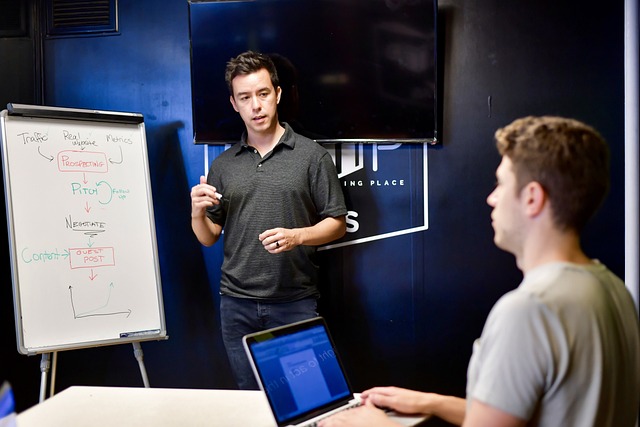- December 27, 2023
- Posted by: David Marshall
- Category: Business, Leadership, Management

When you were coming up in your career, you no doubt had mentors, people who would help you in your job and prepare you for the next step in your career. These were people who were undoubtedly older, wiser, more experienced, and very knowledgeable.
But does that stop once you reach the C-suite? Once you’ve hit your mid-50s and you’re presumably at the top of your career path, are you done learning and getting better?
Not at all. Nothing could be further from the truth.
It’s important for executives to have mentors, even when they’re at the top of their profession and sit on top of the organization. For one thing, you should always be in a state of learning and trying to get better.
 For example, executives who want to do something completely new and foreign, like social media, definitely need a mentor. (But there’s a very good chance that it’s going to be someone who’s much younger than they are. If that’s the case, you’re going to have to get over the whole age thing.)
For example, executives who want to do something completely new and foreign, like social media, definitely need a mentor. (But there’s a very good chance that it’s going to be someone who’s much younger than they are. If that’s the case, you’re going to have to get over the whole age thing.)
So how do you find a mentor, whether it’s social media or otherwise? What should you look for in a relationship?
Finding a Mentor When You’re an Executive
Generally, your executive mentor would be someone you were friends with and could bounce ideas off of. You could share your planning, and they can either laugh at you (in a supportive way), or say it could work, or give you the problem areas to watch out for.
From a very early age, I was lucky because I found a mentor who could help me. He was an old Jewish guy named Abbie Grayson.
And he drove me crazy!
His idea of mentoring was to make you think about your problem yourself. You’d take a problem to him, he’d ask you some questions, but you would leave with the exact same problem! But eventually, you sorted it all out, and your solution generally worked.
So if I had a problem, I would call him, and we would agree to meet. It wasn’t anything formal and we never actually made it an official mentorship, but I knew I could always call on him whenever I needed it. After that, as I moved on in my career, I always made sure to find mentors in people I respected and liked.
One of the people I really respected and liked was Jack Welch, the former chairman of GE. He was very single-minded about what he did. He didn’t have to be right to be single-minded, he just turned out to be right in his decisions. He ran a very profitable business for a long time, and if you got any ideas or thoughts from him, you generally could count on the advice being solid.
A mentor can come from a lot of different places and in different forms. They don’t have to be formal relationships, the mentors often just fall into the role. They do it because they like you and you like them. There’s a mutual understanding, and you just move into that sort of relationship.
I’ve been lucky enough to have that my whole working life.
But today, I don’t see people putting themselves out that way — they’re not seeking mentor-mentee relationships or trying to get advice from other people. People are afraid to ask questions because they’re worried it will be seen as a deficiency.
They don’t have anyone they can go ask about how to deal with a particular problem. And they’re not willing to receive feedback about where they went wrong. They don’t have someone who can say, “That was a problem. How are you going to avoid it again?”
You Need People to Be Direct
Another mentor I had was John Elliott, the owner of Elliott Electric. More than anything, he taught me patience and how to find the right time to ask for certain things.
When you’re younger, there are times that you’ll often be brash and in a hurry to do something. But the people around you won’t tell you when you’re being brash. They just brush you off, and you don’t hear anything about it, so you never know that you have to fix things.
But John taught me to slow down and take things down a notch. He taught me when I was being brash, rushing things, and moving too fast for my own good. He taught me that my idea might not be wrong, but the timing is screwed up.
He taught me by being direct and just telling me when I was screwing up. It may have hurt to hear at the moment, but I knew that he did it because he liked me. While the feedback hurt in the moment, I also knew it was going to help me in my career — I knew that if he didn’t like me, he just wouldn’t tell me. So I always tried to keep that in mind whenever I received some feedback that stung. a bit.
That’s the challenge of being a mentor and being willing to be mentored. If you don’t like your mentor or the person giving you advice, then you wouldn’t get your ego in a knot. You don’t want to disappoint the other person and have them think badly of you. But the fact that it hurts means you think highly of the other person and you don’t want to be seen as someone who screwed up.
I’ve been a manufacturing executive, as well as a sales and marketing professional, for a few decades. Now I help companies turn around their own business, including pivoting within their industry. If you would like more information, please visit my website and connect with me on Twitter, Facebook, or LinkedIn.
Photo credit: DiggityMarketing (Pixabay, Creative Commons 0)

